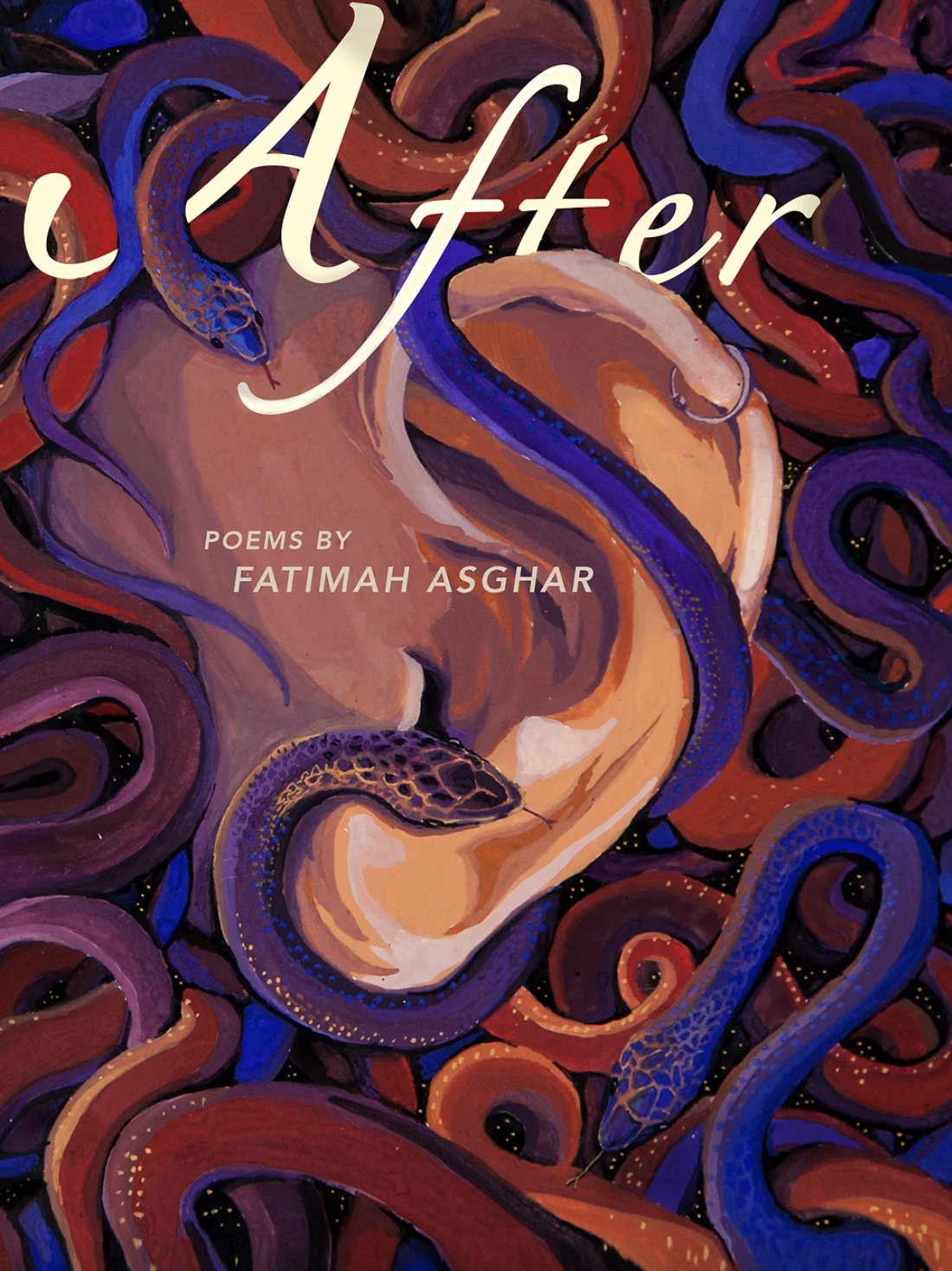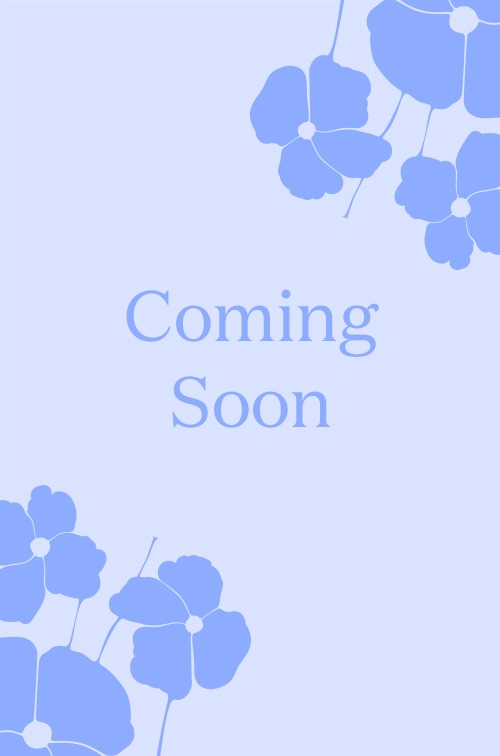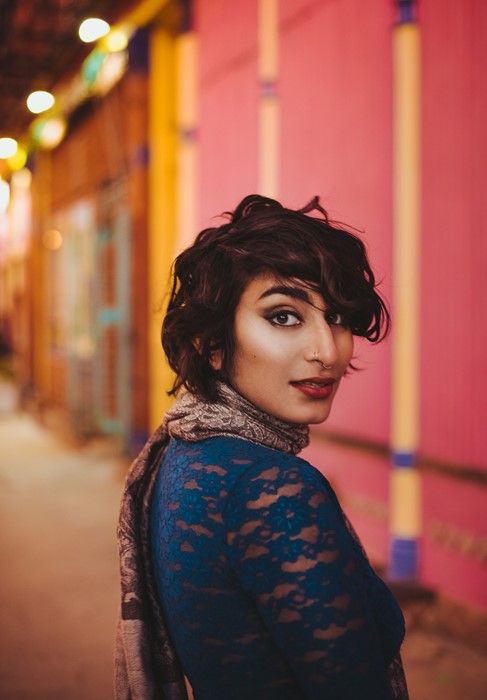& yes, my family did raise me right. Yes
they stripped their bones & cracked them clean
open to suck. Would fight over cartilage & knuckle.
Sip the marrow’s nectar from urn. Yes, I watched.
Yes, I’ll teach my children the same. To savor
the sound of their teeth against bone pulling & pulling
always in search of more. But right now I’m eating alone
in a strange city with money in my pocket
no children waiting to be fed or taught. Meat on the bones,
skin in the trash. Joints a trap of bird & muscle
wanting to be chewed. Let me be young & disrespectful.
Let me leave my plate an unfinished slaughter.
Let me spend & eat until I, no one else, says I’m done.

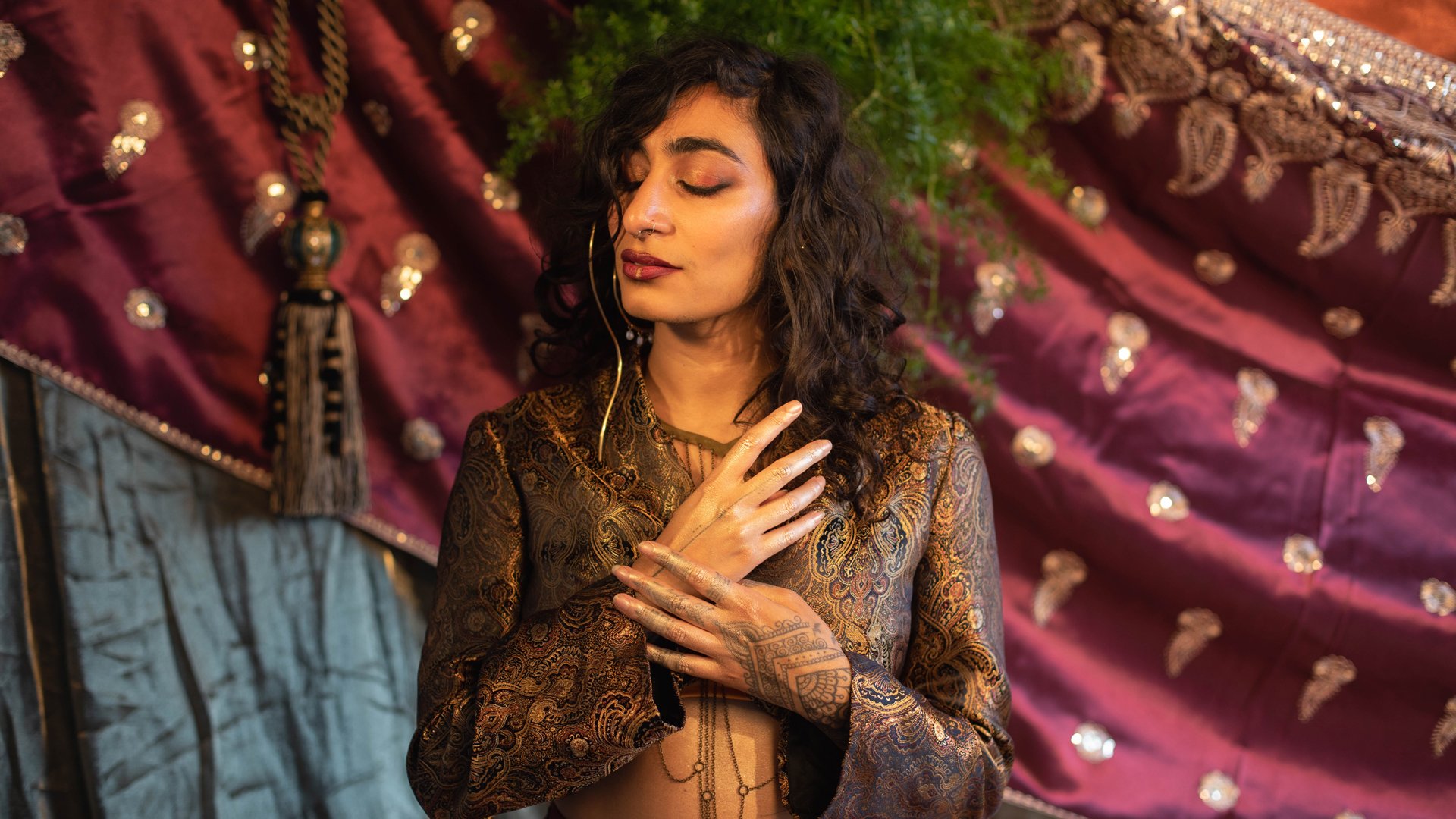
Fatimah Asghar
Acclaimed Poet, Novelist, Screenwriter
National Book Award Longlist
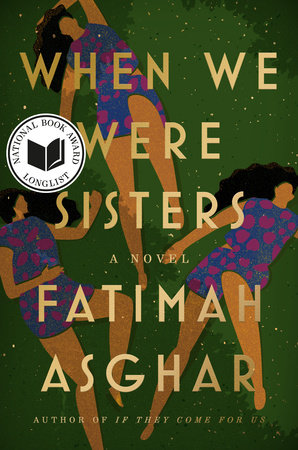
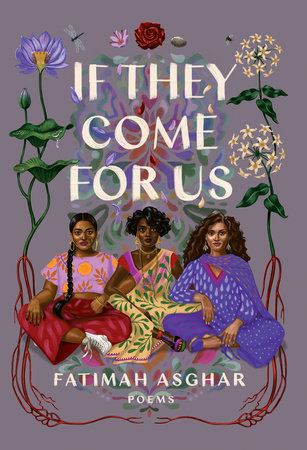
Readings &
Lecture Topics
- On Lyric as a Form of Decolonization
- An Evening with Fatimah Ashgar
Biography
“In forms both traditional and unorthodox Asghar interrogates divisions along lines of nationality, age, and gender, illuminating the forces by which identity is fixed or flexible.” –The New Yorker
“These poems–both personal and historical, both celebratory and aggrieved–are unquestionably powerful in a way that would doubtless make both Gwendolyn Brooks and Harriet Monroe proud.” –Chicago Review of Books
Poet, screenwriter, educator, and performer, Fatimah Asghar is a South-Asian American Muslim writer who cares less about genre and instead prioritizes the story that needs to be told and finds the best vehicle to tell it. They are the author of If They Come For Us (One World, 2018), a collection of poems on orphaning, family, Partition, borders, shifting identity, and violence; the lyrical novel, When We Were Sisters (One World, 2022), an exploration of sisterhood, orphaning, and alternate family building which was longlisted for the National Book Award, Aspen Words Literary Prize, and the Center for Fiction’s First Novel Prize; as well as the chapbook After (Yes Yes Books, 2015).
Play is critical in the development of Asghar’s work, as is intentionally building relationship and authentic collaboration. Along with Safia Elhillo, they co-edited Halal If You Hear Me (Haymarket Books, 2019), an anthology for Muslim people who are also women, trans, gender non-conforming, and/ or queer. The anthology was built around the radical idea that there are as many ways of being Muslim as there are Muslim people in the world.
They are the writer and co-creator of Brown Girls, an Emmy-nominated web series that highlights friendship among women of color. They also served as a co-producer for Ms Marvel on Disney + and wrote the episode “Time and Again.” Their episode was listed on The New York Times and Hollywood Reporter’s best episodes of 2022 list.
Asghar is a member of the Dark Noise Collective and a Kundiman Fellow. In 2017, they were a recipient of the Ruth Lilly and Dorothy Sargent Rosenberg Poetry Fellowship from the Poetry Foundation, and listed on Forbes’s 30 under 30 list.
Short Bio
Poet, screenwriter, educator, and performer, Fatimah Asghar is a South-Asian American Muslim writer who cares less about genre and instead prioritizes the story that needs to be told and finds the best vehicle to tell it. They are the author of If They Come For Us, When We Were Sisters, and the chapbook After. Asghar is a member of the Dark Noise Collective and a Kundiman Fellow. In 2017, they were a recipient of the Ruth Lilly and Dorothy Sargent Rosenberg Poetry Fellowship from the Poetry Foundation, and listed on Forbes’s 30 under 30 list.
Visit Author WebsiteVideos
Publications
When We Were Sisters
Novel, 2022
In this heartrending, lyrical debut work of fiction, the acclaimed author of If They Come for Us traces the intense bond of three orphaned siblings who, after their parents die, are left to raise one another. The youngest, Kausar, grapples with the incomprehensible loss of their parents as she also charts out her own understanding of gender; Aisha, the middle sister, spars with her “crybaby” younger sibling as she desperately tries to hold on to her sense of family in an impossible situation; and Noreen, the eldest, does her best in the role of sister-mother while also trying to create a life for herself, on her own terms.
As Kausar grows up, she must contend with the collision of her private and public worlds, and choose whether to remain in the life of love, sorrow, and codependency that she’s known or carve out a new path for herself. When We Were Sisters tenderly examines the bonds and fractures of sisterhood, names the perils of being three Muslim American girls alone against the world, and ultimately illustrates how those who’ve lost everything might still make homes in one another.
If They Come For Us
Poetry, 2018
From a co-creator of the Emmy-nominated web series Brown Girls comes an imaginative, soulful debut poetry that collection captures the experiences of being a young Pakistani Muslim woman in contemporary America. Orphaned as a child, Fatimah Asghar grapples with coming of age and navigating questions of sexuality and race without the guidance of a mother or father. These poems at once bear anguish, joy, vulnerability, and compassion, while also exploring the many facets of violence: how it persists within us, how it is inherited across generations, and how it manifests itself in our relationships. In experimental forms and language both lyrical and raw, Asghar seamlessly braids together marginalized people’s histories with her own understanding of identity, place, and belonging.
After
Poetry, 2015
“An exploration of love, loss and body, After tells the story of a young South Asian woman birthed into America. Weaving magic realism and formal experimentation, Asghar rewinds through a hectic journey filled with abuse and unbelonging. Mythical creatures, strange settings, and disjointed memories combine to chronicle the journey of a woman who learns her body through the eyes and hands of others, before defining it for herself. Fatimah Asghar isn’t messing around. Her poems swell thick with blood and honor and shameless sensuality, pulling the reader down into the rapid marrow of hunger and grief and feral love, demanding we do whatever the fuck we must to belong to our bodies and god them eternal.” —Rachel McKibbens, Pink Elephant
Articles & Audio
Read What’s In Print
• Sisterhood Beyond Womanhood in When We Were Sisters – Chicago Review of Books
• Fatimah Asghar’s poetry captures a queer Pakistani Muslim woman in America – Dazed Digital
• Poet Fatimah Asghar On South Asian Culture, Queerness, & Micro-Aggression Bingo – Bustle
• Like a Knife: A Review of Fatimah Asghar’s If They Come For Us – The Adroit Journal
• Review: If They Come for Us by Fatimah Asghar – Los Angeles Review
• “Shed the Stories that Keep You Stuck”: An Interview with Fatimah Asghar – Chicago Review of Books
• A Body Divided: A Review of Fatimah Asghar’s If They Come For Us – The Nassau Literary Review
Listen to Audio
• 73: If They Come for Us – The Slow Down Show
• VS Live with Fatimah Asghar, José Olivarez, and Paul Tran – Poetry Foundation
• Fatimah Asghar on Our Unseen Identities – The Mash Up Americans
Selected Writings
• Read “How’d Your Parents Die Again?” – New York Times
• Read “Finding the Hammam: In favor of haraam auntie poetics” – Poetry Foundation
Look, I’m Not Good at Eating Chicken

